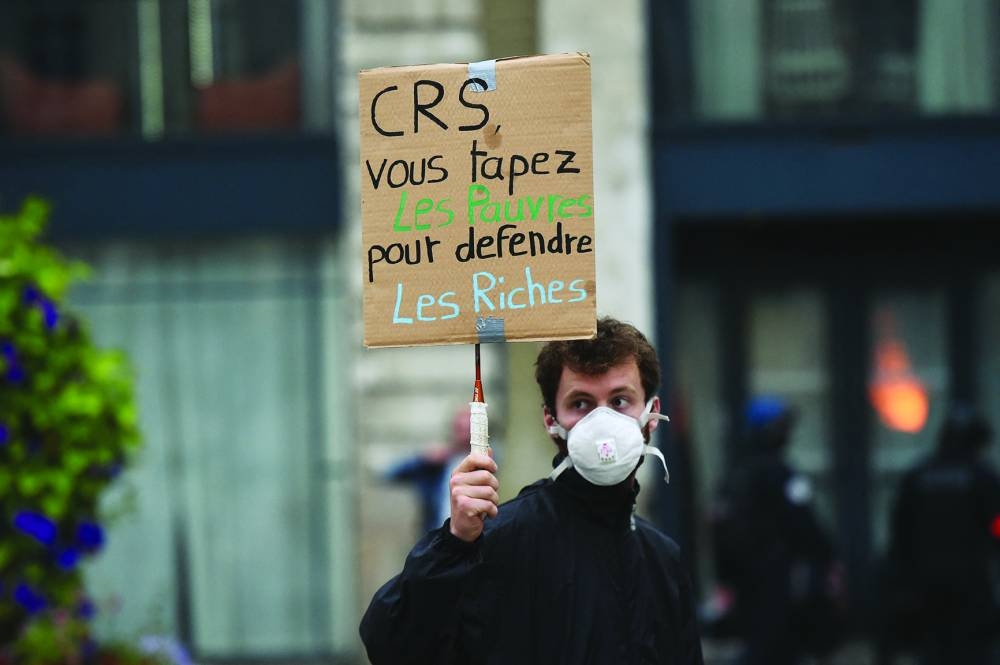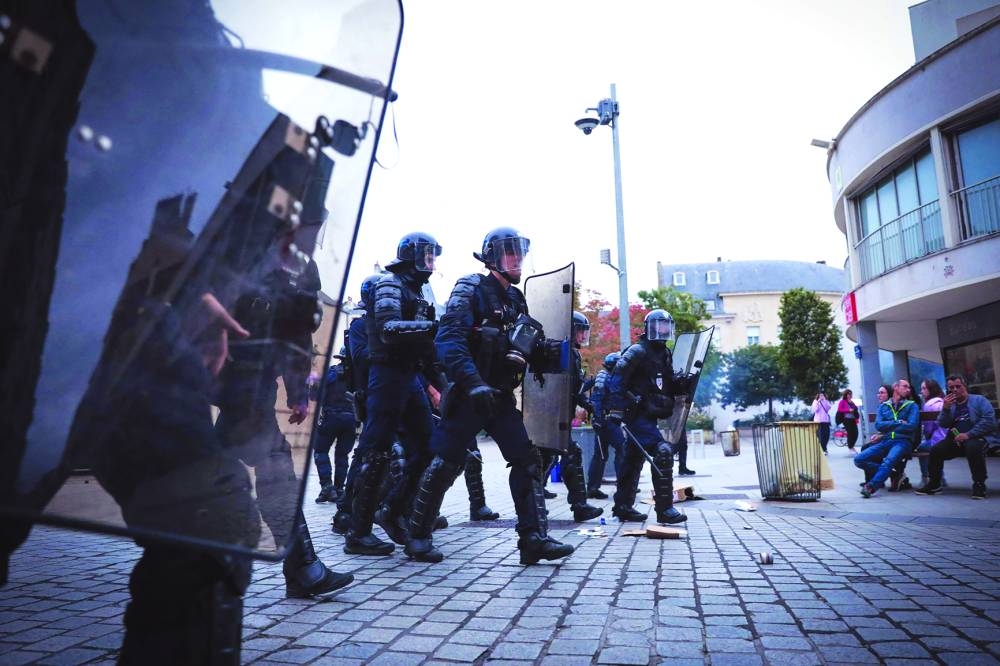President Emmanuel Macron has postponed a state visit to Germany in order to deal with the urban rioting that has rocked France for the last four nights, as the 17-year-old whose killing by police sparked the protests was laid to rest.
Police arrested 1,311 people overnight from Friday, the highest figure since the violent protests began over the point-blank killing by a policeman of Nahel M in the Paris suburb of Nanterre on Tuesday.
Shops were ransacked and town halls attacked in various locations nationwide by gangs, often made up of teens organised on social media and armed with fireworks, despite the interior ministry sending out 45,000 members of the police and also armoured vehicles.
Finance Minister Bruno Le Maire said more than 700 shops supermarkets, restaurants and bank branches had been “ransacked, looted and sometimes even burnt to the ground since Tuesday”.
The protests over the death of the teen, who was of Algerian origin, have again exposed the severe racial tensions in modern France and increased scrutiny on the police who have long been accused of singling out minorities.
The crisis is a hugely unwelcome development for the president, who was looking forward to pressing on with his second mandate after seeing off protests that erupted in January over raising the pensions age.
The German presidency announced that Macron spoke by telephone with German President Frank-Walter Steinmeier “and informed him of the situation in his country” as he requested the visit scheduled to begin Sunday be postponed.
The move is especially embarrassing for Macron, who earlier this year was forced to postpone a visit by Britain’s King Charles III to France due to the protests over pensions.
Nahel M’s funeral ceremony began in the Paris suburb of Nanterre where he lived, with a large crowd gathering at the local cemetery in a tense atmosphere, an AFP reporter said.
Salsabil, a young woman of Arab descent, told Reuters that she had come to express support for Nahel’s family.
“I think it’s important we all stand together,” she said.
Marie, 60, said she had lived in Nanterre for 50 years and there had always been problems with the police.
“This absolutely needs to stop. The government is completely disconnected from our reality,” she said.
The shooting of the teenager, caught on video, has reignited longstanding complaints by poor and racially mixed urban communities of police violence and racism.
Macron had denied there is systemic racism in French law enforcement agencies.
“If you have the wrong skin colour, the police are much more dangerous to you,” said a young man, who declined to be named, adding that he was a friend of Nahel’s.
In a rare intervention on a social issue, the French national football team, many of whose top players are of minority background, joined calls for an end to the clashes.
“The time of violence must give way to that of mourning, dialogue and reconstruction,” the team said in a statement posted on social media by captain and Paris Saint-Germain superstar Kylian Mbappe.
Interior Minister Gerald Darmanin said that overall the scale of violence was not as intense as that of previous nights, but there was still intense rioting in a number of areas, including the cities of Marseille, Lyon and Grenoble, with bands of often-hooded rioters pillaging shops.
Provisional ministry numbers released early yesterday said 1,350 vehicles and 234 buildings had been torched overnight, and there had been 2,560 incidents of fire set in public spaces.
The southern port city of Marseille was again the scene of clashes and looting from the centre and further north in the long-neglected low-income neighbourhoods that Macron visited at the start of the week.
In a bid to limit the violence, buses and trams in France have stopped running after 9pm (1900 GMT) and the sale of large fireworks and inflammable liquids has been banned.
Marseille is going a step further by halting all urban transport from 6pm, including metros, and banning all protests this weekend.
Police reinforcements have been sent to the city, including armoured vehicles and two helicopters.
Macron, who initially denounced an “unforgivable” death, has also criticised an “unacceptable exploitation of a death of an adolescent” in some quarters and vowed to work with social networks to curb “copycat violence”.
He also urged parents to take responsibility for underage rioters, one-third of whom were “young or very young”.
Justice Minister Eric Dupond-Moretti said 30% of those arrested were minors.
More than 200 police officers have been injured, Interior Minister Gerald Darmanin said, adding that the average age of those arrested was 17.
The UN rights office said on Friday that the killing of the teen of North African descent was “a moment for the country to seriously address the deep issues of racism and racial discrimination in law enforcement”.
The unrest has raised concerns abroad, with France hosting the Rugby World Cup in the autumn and the Paris Olympic Games in the summer of 2024.
Britain and other European countries updated their travel advice to warn tourists to stay away from areas affected by the rioting.
“Our hotel members have suffered a wave of cancellations of reservations in all the territories affected by the damage and clashes,” said chef Thierry Marx, president of the main association for hotel and catering industry employers.
A 38-year-old policeman has been charged with voluntary homicide over the teenager’s death and has been remanded in custody.
The unrest has revived memories of nationwide riots in 2005 that forced then-president Jacques Chirac to declare a state of emergency, after the death of two young men electrocuted in a power substation as they hid from police.

A man holds a placard that reads ‘CRS (police) you bash the poor to defend the rich’, during a protest in Nantes.

French riot police officers patrol during a demonstration in Caen, north-western France.
